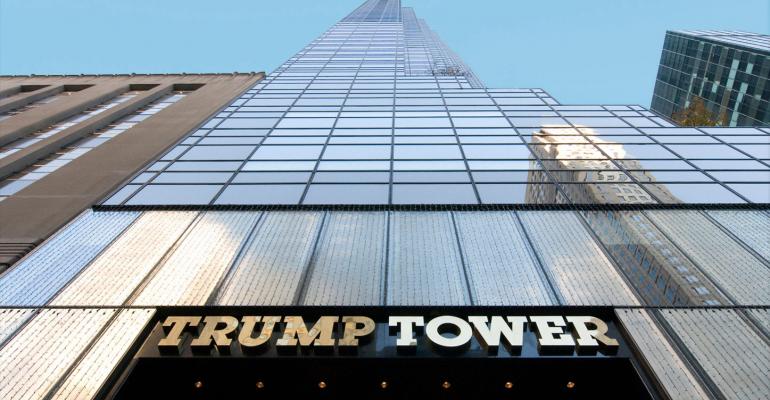(Bloomberg) — Real estate developer Louis Ceruzzi has grand plans for a sleek $1 billion Manhattan skyscraper, featuring luxury shops and condos that soar high above Fifth Avenue.
Two years after Ceruzzi and a partner bought the site, they have yet to break ground. For now, all he has to show for his trouble is an empty lot, an idle backhoe and scattered piles of rubble.
The delay suggests an irony: even with election of Donald Trump, the first developer as president, commercial real estate investment has slowed to a near standstill—especially in Trump’s hometown, the nation’s largest market.
In New York City, first-quarter property sales plummeted 58 percent, to $4.3 billion, compared with a year earlier, according to data from brokerage Cushman & Wakefield Inc. It marked the lowest quarterly sales volume in six years. Nationwide, the picture wasn’t much better. Sales dropped 18 percent, research firm Real Capital Analytics Inc. found.
“People are just not making decisions quickly at all,” said Robert Verrone, a principal at Iron Hound Management Co., a New York-based real estate advisory firm. “Everything in real estate is taking longer.”
Much of the slowdown has nothing to do with Trump. Concern is mounting that real estate prices have peaked following six years of record-shattering growth, and there are signs of overbuilding in large cities such as New York and San Francisco—the biggest beneficiaries of the recent boom.
Some of this hesitancy, however, can be traced to Trump’s gilded door. Real estate investors worry that Trump’s industry-friendly tax cuts will fail to pass. At the same time, others figure that lower taxes and higher spending could spark inflation and rising interest rates—a liability in the debt-driven business.
“If the rules of the game they have been playing for 30 years might change, that gives investors pause,” said Dave Bragg, an analyst at Green Street Advisors LLC., a Newport Beach, California-based real estate research firm.
It’s not just taxes. Uncertainty about the fate of Trump’s entire economic agenda is holding up deals across the country. Buyers and sellers “need to have shared expectations” before signing on the dotted line, said Jeff Friedman, a principal at Mesa West Capital, a Los Angeles-based real estate investment firm.
As sales of existing properties languish, developers are mired in a glut of hotels, condos and apartment complexes following a construction boom. Landlords are cutting rents and prices, and spooked lenders are holding back.
In Manhattan, even the biggest names in real estate are scrambling. To scale back debt, Harry Macklowe, a fixture in the business since the 1960s, is revamping his condo conversion of 1 Wall Street, a New York landmark. Macklowe is well aware of risk since he lost the General Motors Building to creditors during the financial crisis.
Time is money, and developers need more. They include Gary Barnett, known for building One57, one of the tallest operational residential skyscrapers in the city. Barnett’s Extell Development had to negotiate with lenders for time to find additional funding for Central Park Tower, a $3 billion skyscraper on West 57th Street that will house the city’s first Nordstrom store.
Some projects appear to be moving forward. Last week, developer Ziel Feldman, a former partner of Barnett, closed on a $1.25 billion loan to start building two towers beside the High Line, the park built atop an unused railroad track in Manhattan’s Chelsea neighborhood.
The financing came together two years after Feldman’s HFZ Capital paid $870 million for the site that occupies a full block. It was one of the most expensive development sites ever sold in the city.
At the time of the acquisition, Feldman said that the project would be ready in 2018. Now, the plan is for 2019. In an interview earlier this month, Feldman said the shift in timing is immaterial and unrelated to the slowing real estate market.
“Of course the pace has slowed down, because the pace was frenzied,” he said. “Well-priced, well-executed buildings” are selling units briskly.
Like Trump, Ceruzzi—the developer with the vacant lot on Fifth Avenue—got his start outside Manhattan. He built shopping centers and apartment buildings in suburban New York and Connecticut before setting his sights on the big city.
In 2015, Ceruzzi teamed up with China’s SMI USA to purchase the plot at 520 Fifth Ave. for about $275 million, almost double the price paid for the property in 2011. They shelled out roughly $50 million more for additional air rights. At the time, Ceruzzi envisioned a 71-story glass skyscraper with retail, a hotel and apartments.
In November of that year, Ceruzzi told the Commercial Observer, a publication that covers the city’s real estate industry, that construction would start in the spring of 2016. On a recent weekday, there were no workers at the site two blocks from Grand Central Station. Ceruzzi didn’t respond to requests for comment.
Even if Trump enacts policy changes that benefit real estate developers, it will take time to translate into improvements in the property market, according to Robert Knakal, chairman of New York investment sales at Cushman & Wakefield.
“It’s not like the stock market.” Knakal said. “Nothing happens overnight.”
To contact the author of this story: Sarah Mulholland in New York at [email protected] To contact the editors responsible for this story: Daniel Taub at [email protected] David Gillen John Hechinger
© 2017 Bloomberg L.P

